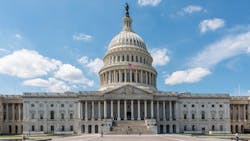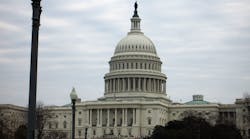House T&I Committee outlines five-year, $494-billion surface transportation reauthorization legislation
The House Committee on Transportation and Infrastructure revealed a five-year, $494-billion surface reauthorization bill. The current surface reauthorization law expires on Sept. 30, 2020.
The Investing in a New Vision for the Environment and Surface Transportation in America (INVEST in America) Act includes funding for transit and passenger rail maintenance and infrastructure projects, as well as low- or zero-emission vehicles. The legislation also includes transit and mobility friendly policies with a focus on safe street design and technology investment to increase reliability of transit.
“The bulk of our nation’s infrastructure—our roads, bridges, public transit and rail systems, the things that hundreds of millions of American families and businesses rely on every single day— is not only badly outdated; in many places it’s downright dangerous and holding our economy back. Yet for decades, Congress has repeatedly ignored the calls for an overhaul and instead simply poured money into short-term patches. The result? We’re still running our economy on an inefficient, 1950s-era system that costs Americans increasingly more time and money while making the transportation sector the nation’s biggest source of carbon pollution,” said Committee Chair Peter DeFazio (D-OR).
He notes the INVEST in America Act is the result of nearly 20 committee hearings, testimony from dozens of witnesses and members of Congress and input from hundreds of advocates and transportation agencies.
“The INVEST in America Act is our opportunity to replace the outdated systems of the past with smarter, safer, more resilient infrastructure that fits the economy of the future, creates millions of jobs, supports American manufacturing and restores U.S. competitiveness,” said Chair DeFazio.
The transits-specific highlights of the bill include:
- Increase in funding for transit agencies to add new routes and provide more reliable service, encouraging viable public transit options and fewer single-occupant cars clogging highways.
- Creation of a Mobility Innovation program to permit transit agencies to collaborate with mobility on-demand services.
- Creation of a grant program to examine the costs and benefits of allowing flexibility in paratransit trips that allow one stop for certain needs like dropping children off at daycare or school or stopping briefly at the pharmacy, grocery store or bank.
- Creation of a training center modeled on the successful National Transit Institute, but with a frontline employee mandate.
- Strengthens Buy America provisions to boost domestic jobs in rail and bus manufacturing.
- Increases investment in zero-emission buses to reduce carbon pollution.
- Streamlines project delivery by reforming the Capital Investment Grants program so that our investments get shovels in the ground quicker and commuters see results faster.
- Provides the investments needed to address the growing backlog of transit maintenance needs, making public transit safer and more reliable.
- Regarding operator safety, the bill would require transit agencies to collect data on the assault of transit workers and would require passenger and commuter railroad carriers to implement response plans and employee training to address assaults against both passengers and employees.
The Amtrak and commuter rail highlights include:
- Tripling of funding for Amtrak to $29 billion over five years, allowing for improvement and expansion of the nation’s passenger rail network, including the Northeast Corridor (NEC) and the National Network, giving travelers a reliable, low-carbon option to travel both short and long distances, including to regions that lack frequent or affordable airport service.
- Investing in Amtrak stations, facilities, services and modernization of its equipment, while continuing Amtrak’s legacy of serving long-distance, state-supported and NEC passengers and ensuring a skilled Amtrak workforce.
- Creation of a new $19 billion program, the Passenger Rail Improvement, Modernization and Expansion (PRIME) grant program, devoted entirely to passenger rail improvements and expansion, performance optimization and intercity passenger rail transportation expansion.
- Increase in funding for the Consolidated Rail Infrastructure and Safety Improvements (CRISI) grant program to $7 billion to fund passenger and freight rail projects. Expands program eligibilities and allows commuter rail authorities to compete for funds.
- Helps communities improve safety at rail crossings with a new $2.5 billion grade-separation grant program.
The bill’s other transit-related highlights include:
- Increases funding for truck and bus safety programs under the Federal Motor Carrier Safety Administration, providing $4.6 billion over five years.
- Complete and context sensitive street design that would revise roadway design standards under 23 USC 109 to require consideration of all users of the transportation facility, including pedestrians, bicyclists, public transit users, children, older individuals, individuals with disabilities, motorists and freight vehicles.
- Revision to the National highway performance program to emphasize state of good repair needs identified in the transportation asset management plan before constructing new highway capacity. States would be required to consider whether an operational improvement or transit project would be more cost-effective than a capacity expansion for single occupancy vehicles.
The bill contains language that would direct the U.S. Department of Transportation to re-obligate funds for high-speed rail projects back to their intended recipients. In 2019, the Federal Railroad Administration de-obligated more than $928 million in federal funding to the California High-Speed Rail Authority.
The bill also continues to tackle the fallout from the COVID-19 pandemic by authorizing a sharp increase in funding to continue current programs in the first year of enactment of the bill (FY 2021) with wider policy implementation occurring in FY 2022. This would provide an additional $5.79 billion in contract authority from the Mass Transit Account above FY20 levels and allows funds obligated in FY21 to be up to 100 percent Federal share. Funds would be distributed using the same formulas as FY20. The bill also includes a provision to ensures that transit data from FY20 and impacted by COVID-19 will not be used in the calculation of FY22 transit formula apportionments.
Reactions to the legislation
The American Public Transportation Association President and CEO Paul P. Skoutelas offered support and praise of the legislation’s transit and passenger rail investments and policies.
“This forward-thinking legislation will transform our nation’s infrastructure and put us on the path to build more equitable communities for all Americans, creating and connecting people to jobs, providing better mobility options for millions and addressing the environmental and sustainability challenges facing our nation and the world,” said Skoutelas. “The bill also includes critical funding and flexibility to enable public transit systems to continue to respond to and recover from the COVID-19 pandemic. In addition to these critical investments, the INVEST in America Act includes important policies from streamlining the Capital Investment Grant program to investing in new technologies like zero-emission buses that will create the transportation systems of the future.”
Committee on Transportation and Infrastructure Ranking Member Sam Graves (R-MO), Subcommittee on Highways and Transit, Ranking Member Rodney Davis (R-IL), Subcommittee on Railroads, Pipelines and Hazardous Materials, and Ranking Member Rick Crawford (R-AR) issued a joint statement on the bill that says Republican priorities were not included. The group says the bill does not offer states flexibility and “outsized funding increases for urban areas” come at the expense of rural areas.
“We also need to consider what our economy is going through because of the COVID-19 pandemic. Many of America’s workers, including those in the transportation sector, continue to grapple with our new, complex and evolving reality. We believe a rapid seismic shift in our transportation programs will add to the already considerable uncertainty in an industry struggling for its survival,” said the Republican committee members. “Although today’s bill does not reflect our input, committee Republicans will continue to work with the Senate, stakeholders and any member of both parties to ensure our priorities are addressed as the legislative process moves forward.”
The House Committee on Transportation and Infrastructure will consider the INVEST in America Act at a committee markup scheduled for Wednesday, June 17.

Mischa Wanek-Libman | Group Editorial Director
Mischa Wanek-Libman is director of communications with Transdev North America. She has more than 20 years of experience working in the transportation industry covering construction projects, engineering challenges, transit and rail operations and best practices.
Wanek-Libman has held top editorial positions at freight rail and public transportation business-to-business publications including as editor-in-chief and editorial director of Mass Transit from 2018-2024. She has been recognized for editorial excellence through her individual work, as well as for collaborative content.
She is an active member of the American Public Transportation Association's Marketing and Communications Committee and served 14 years as a Board Observer on the National Railroad Construction and Maintenance Association (NRC) Board of Directors.
She is a graduate of Drake University in Des Moines, Iowa, where she earned a Bachelor of Arts degree in Journalism and Mass Communication.




